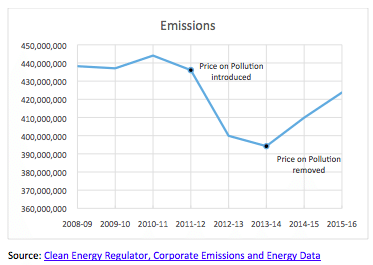New data shows the federal government's climate policies are simply not working.
By Matthew Rose and Suzanne Harter
If the Turnbull government had to pay a dollar for every time a minister claimed Australia was ‘meeting and beating’ its climate targets, the money would be stacking up. Their claims, however, would not.
New data, just released under the National Greenhouse & Energy Reporting Scheme, shows the climate policies of Prime Minister Malcolm Turnbull and Environment & Energy Minister Josh Frydenberg are simply not working.
The data reflects the emissions of approximately 400 of Australia’s biggest companies and sits alongside the National Greenhouse Gas Inventory as an indicator of our emissions trajectory.
The 10 biggest polluters remain the same as last year, although the order has slightly changed.
They include Australia’s biggest electricity generators, AGL, Energy Australia, Origin, Engie and CS Energy, along with mining giants Rio Tinto and Glencore.
Overall, climate pollution is up by 3.4 per cent since last year and by 7.5 per cent since the Abbott-Turnbull government axed the carbon price.
Unlike the government’s current policy, the carbon price was reducing Australia’s pollution. This is evident in the data.
The new data also shows pollution from Australia’s electricity sector, which is responsible for about 35 per cent of our climate pollution, went up 2.6 per cent on the previous year and 5 per cent since the carbon price was removed.
The pollution increases — from specific generators and overall — show there is little incentive for big polluters to clean up their acts when they have a free ride to pollute.
Meanwhile, global warming continues to damage Australian treasures, like the Great Barrier Reef, and increase the likelihood and severity of heatwaves and bushfires.
And there’s no sign Australia’s international commitments under the Paris agreement, including our 2030 target for 26-28 per cent pollution reduction in 2005 levels, will be able to be reached without major policy changes that see Australia phase out fossil fuels and enable a rapid transition to clean renewable energy.
However, instead of acknowledging global warming as a national crisis that demands immediate serious action, the federal government is considering loaning Adani $1 billion for a coal-carting railway line from the Galilee Basin to the Great Barrier Reef coast and wants the Clean Energy Finance Corporation to fund new coal-fired power stations.
Instead of acknowledging global warming as a national crisis that demands immediate serious action, the federal government is considering loaning Adani $1 billion for a coal-carting railway line from the Galilee Basin to the Great Barrier Reef coast and wants the Clean Energy Finance Corporation to fund new coal-fired power stations.
None of this stacks up for investors that see coal in terminal decline and are unwilling to sink their money into facilities that will undoubtedly end up as stranded assets.
Nor is support for coal consistent with our Paris commitments, which include driving down pollution to net zero well before mid-century keeping global warming under 1.5—2 degrees.
Mr Turnbull and Mr Frydenberg apparently value the political points that can be scored by demonising renewable energy above the safe future that can be secured by transforming our energy system from dirty to clean.
In the past few months Australians have witnessed an increasingly divisive political attack on renewable energy. Renewable energy has been blamed for just about all that ails the energy system — especially electricity price rises and blackouts.
Never mind that price spikes are actually caused by a range of factors, including the high price of gas and a concentration of market power.
And never mind the failures of the National Electricity Market and the Australian Energy Market Operator when it comes to energy security.
The outages in South Australia were the result of a range of failures — and the Australian Energy Market Operator’s own report on the last outage acknowledged that many were its own.
Regardless, Turnbull and Frydenberg continue to blame renewable energy. The data released this week is hard evidence Australia’s pollution is going up and that means Turnbull and Frydenberg’s policies are failing.
Matthew Rose is the Australian Conservation Foundation’s economist; Suzanne Harter is ACF’s climate change campaigner
This piece was first published by RenewEconomy


